Description
Yellow Blossom Sweet Clover – Melilotus officinalis
Yellow Blossom Sweet Clover is a versatile and beneficial plant commonly used in agriculture and conservation efforts. It is also a great source of pollen and nectar for honeybees and other native pollinators. Its long taproot helps to loosen hard-packed soils and helps to bring up minerals to the soil surface making them available for future plantings.
Plant during the cool seasons of your area. The plants will establish growth in the first year and bloom in the second year. After the blooming of the second year, the plants will die. Do not mow during the first year. Spring-seeded yellow blossom sweet clover may be plowed under in the fall or winter of the first year to build organic matter into the soil and boost nitrogen levels.
Seeding Rate: 1 lb./1000 sq.ft. up to 8 lbs. per acre
Cover with 1/8-1/4 inch of soil or rake in, and keep moist until germination.
. Here’s more detailed information about this species:
- Plant Description: Yellow Blossom Sweet Clover is a biennial or short-lived perennial legume that belongs to the Fabaceae family. It typically grows to a height of 2 to 6 feet (60-180 cm) and has compound leaves with three oval-shaped leaflets. The plant’s most distinctive feature is its bright yellow, fragrant flowers, which grow in clusters on tall spikes. These blooms attract various pollinators, including honeybees and native bees.
- Growing Conditions: Yellow Blossom Sweet Clover thrives in cooler climates, is well-suited to temperate regions, and is drought tolerant. It prefers full sun but can tolerate partial shade. It is adaptable to a range of soil types, including loam, clay, and sandy soils, as long as they are well-drained. This adaptability makes it a valuable option for improving soil quality in various settings.
- Nitrogen Fixation: One of the key attributes of Yellow Blossom Sweet Clover is its ability to fix nitrogen (up to 125 lbs/acre) from the atmosphere into the soil. Through a symbiotic relationship with nitrogen-fixing bacteria in its root nodules, it can convert atmospheric nitrogen into a form that plants can readily use. This nitrogen enrichment benefits neighboring plants, making it a valuable component of crop rotations and cover cropping.
- Soil Improvement: This plant’s extensive taproot helps break up compacted soils, improving soil structure and aeration. As the plant decomposes, it adds organic matter to the soil, further enhancing its fertility and moisture-retention capacity. It also brings up essential minerals from deep within the soil, making them accessible to other plants.
- Erosion Control: Yellow Blossom Sweet Clover’s deep root system aids in preventing soil erosion by stabilizing soil particles and reducing runoff. This makes it an excellent choice for erosion control on slopes and in areas prone to soil erosion.
- Wildlife and Pollinator Benefits: Beyond its agricultural utility, Yellow Blossom Sweet Clover is a valuable resource for wildlife. Its flowers provide nectar and pollen for honeybees and native pollinators, supporting biodiversity and ecosystem health.
- Culinary and Medicinal Uses: Historically, Yellow Blossom Sweet Clover has been used in traditional medicine and as a culinary herb. However, it should be noted that some varieties of sweet clover contain coumarin, which can be toxic in large quantities. Therefore, caution is advised when considering its use for culinary or medicinal purposes.
- Lifecycle: Yellow Blossom Sweet Clover typically grows vigorously in the first year, establishing its root system and foliage. Flowering occurs in the second year, after which the plant completes its lifecycle and dies back. This natural cycle makes it a suitable choice for crop rotations and soil improvement practices.
In summary, Yellow Blossom Sweet Clover is a valuable plant in agriculture and conservation due to its nitrogen-fixing abilities, soil improvement properties, erosion control capabilities, and support for pollinators. It offers numerous benefits to both farmers and the environment when integrated into land management practices.
Here is some great information on cover crops.
Color: Yellow flowers
Height: 4-6′
Type: Biennial
Climate: Sun – Avg.
Seeds/lb.: 210,000
Seeding Rate: 1 lb./1000 sq.ft. up to 8 lbs. per acre
Bloom Time: Spring-Early Summer of the second year
Zone: 3 – 9
For more information, check out our Wildflower Seed Planting Tips.
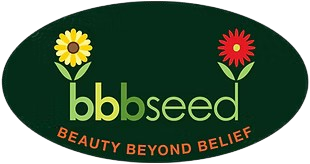
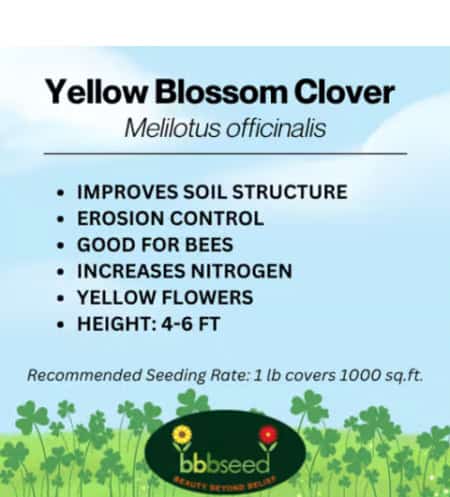
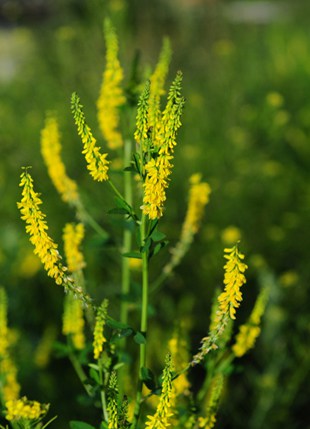


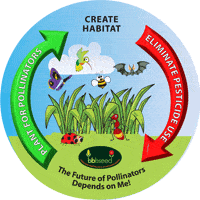
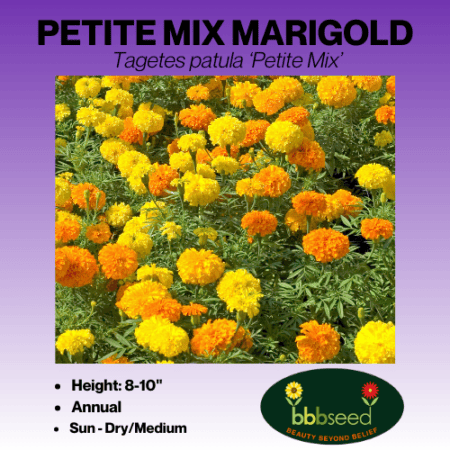



Reviews
There are no reviews yet.